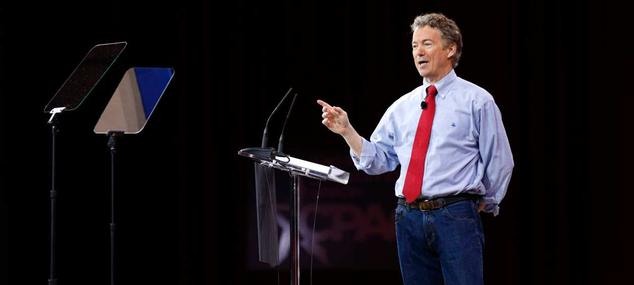Story Highlights
- Paul better known and liked than several presidential competitors
- Paul best liked by U.S. Republicans under age 50
- Ted Cruz best-liked presidential candidate among conservatives
WASHINGTON, D.C. -- As U.S. Sen. Rand Paul officially began his quest for the Republican presidential nomination Tuesday, nearly seven in 10 Republicans (68%) are familiar with the freshman senator from Kentucky. Paul also enjoys a positive image within the party: A majority of Republicans have a favorable opinion of Paul (51%) while 17% view him unfavorably, for a net favorable score of +34.
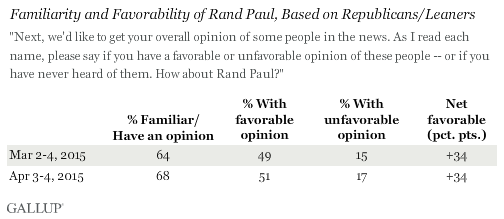
These results come from a Gallup poll conducted April 3-4, 2015, just prior to Paul's public announcement that he will seek the 2016 Republican nomination.
Paul's pursuit of the country's highest office begins a new chapter in what has been an unpredictable and rapid rise to national prominence. The son of eccentric Republican Congressman and failed three-time presidential candidate Ron Paul, the younger Paul unexpectedly stormed his way into the Senate in the 2010 midterm with significant Tea Party support. Once in office, Paul often found himself at odds with both major parties. In some policy matters, such as foreign relations, Paul has staked positions that have irked influential members of his Republican caucus, while in other matters, such as economics and budgetary policy, he has advocated for outcomes opposed by most Democrats.
But if some of Paul's signature political views stand in contrast to prevailing Republican ideology, it is not evident in his familiarity rating and net favorable score. Among four current and potential GOP candidates Gallup measured, only Jeb Bush, a politician whose candidacy in many ways symbolizes the very "establishment" Paul is seeking to overturn with his presidential bid, is more familiar (81%) to Republican adults. Paul is about as familiar to Republicans as Ted Cruz (65%). Cruz, however, entered the race as the first major GOP candidate on March 23, a move that saw his familiarity rating climb eight percentage points from early March. Florida Sen. Marco Rubio, who is expected to reveal his presidential intentions next week, is slightly less known (60%) than Paul.
Whatever difficulties Paul may have had with senior members of his party in the Senate -- his colleague Sen. John McCain once referred to him as a "wacko bird" -- appear to have had limited effect on Paul's favorability with Republicans, which stands at 51%. Indeed, while his favorable rating is at statistical parity with that of Bush (53%), the share of Republicans who see Paul in an unfavorable light (17%) is well below that of the better-known Bush (28%).
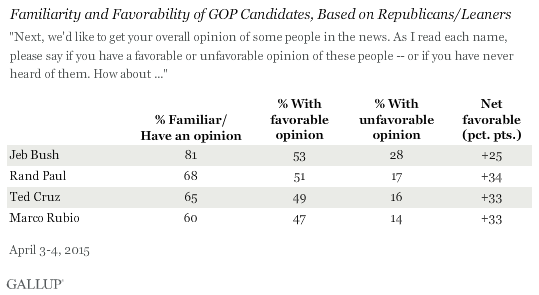
Paul Popular Among Young Republicans
Key to Paul's electoral and overall governing strategy is extensive outreach to younger adults, a strategy he may have learned from his father's tech-savvy campaigns. Relatively speaking, Paul is well-positioned with younger Republicans -- a majority under the age of 50 have a favorable opinion of him (51%). Paul is statistically tied with the better-known Bush (49%) among this group, and he is well ahead of Cruz (37%) and Rubio (32%).
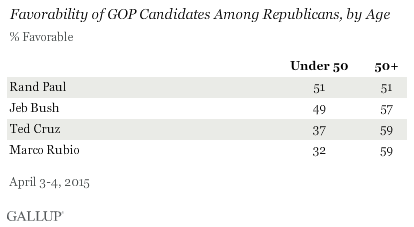
Conservative Republicans Most Favorable to Cruz
Though Paul is closely associated with the conservative Tea Party movement, he is not currently the most well-liked candidate among conservative Republicans. Conservatives -- who make up 77% of Republican Tea Party supporters -- instead give the highest favorable rating to Cruz, at 63%, while Paul is roughly tied with Bush at just under 60%. Rubio has 53% of conservative Republicans viewing him favorably.
Some of these differences, however, are due to disparities in familiarity. Bush's net favorable score is higher in part because he is the most well-known. But he also has the highest unfavorable rating among conservatives, thus giving him the lowest net favorable score of the four, at +30. In terms of net favorability, Paul's +40 puts him well ahead of Bush and tied with Rubio (+41), but still trailing Cruz at +51.
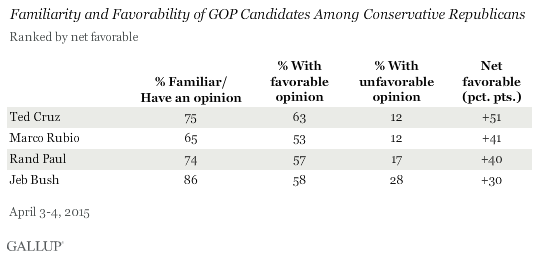
Bottom Line
Rand Paul's presidential campaign will likely not focus on his libertarian origins or endorse every position his father took in past campaigns. Yet Paul has a legislative record that may not align with mainstream Republican views either, especially in areas of foreign policy or national security issues such as the National Security Agency's surveillance program. Of course, Paul can still point to his battles to reduce federal spending and budget deficits, as well as his advocacy for other conservative causes, as signs of his Republican bona fides.
As Paul tries to gain traction in a brimming Republican field, his opponents will undoubtedly call attention to his supposed political heresies. Time will tell if this strategy is successful in discrediting Paul among the Republican primary electorate -- but after spending nearly six years in the Senate staking out controversial political positions, Paul nonetheless enjoys comparably high familiarity and favorability ratings with the GOP.
Survey Methods
Results for this Gallup poll are based on telephone interviews conducted April 3-4, 2015, on the Gallup U.S. Daily survey, with a random sample of 1,023 adults, aged 18 and older, living in all 50 U.S. states and the District of Columbia. For results based on the total sample of national adults, the margin of sampling error is ±4 percentage points at the 95% confidence level. For results based on the total sample of Republicans and Republican leaners, the margin of sampling error is ±6 percentage points at the 95% confidence level.
All reported margins of sampling error include computed design effects for weighting.
Each sample of national adults includes a minimum quota of 50% cellphone respondents and 50% landline respondents, with additional minimum quotas by time zone within region. Landline and cellular telephone numbers are selected using random-digit-dial methods.
Learn more about how the Gallup U.S. Daily works.
